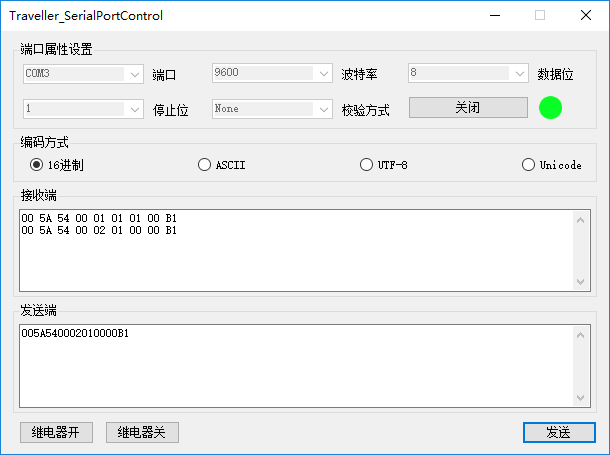因为参加一个小项目,需要对继电器进行串口控制,所以这两天学习了基本的串口编程。同事那边有JAVA的串口通信包,不过是从网上下载的,比较零乱,难以准确掌握串口通信的流程和内含。因此,个人通过学习网上大牛的方法,利用C#实现了基本的串口通信编程。下面对学习成果进行总结归纳,希望对大家有所帮助。
一、串口通信简介
串行接口(串口)是一种可以将接受来自CPU的并行数据字符转换为连续的串行数据流发送出去,同时可将接受的串行数据流转换为并行的数据字符供给CPU的器件。一般完成这种功能的电路,我们称为串行接口电路。
串口通信(Serial Communications)的概念非常简单,串口按位(bit)发送和接收字节。尽管比按字节(byte)的并行通信慢,但是串口可以在使用一根线发送数据的同时用另一根线接收数据。串口通信最重要的参数是波特率、数据位、停止位和奇偶校验。对于两个进行通信的端口,这些参数必须匹配。
1. 波特率:这是一个衡量符号传输速率的参数。指的是信号被调制以后在单位时间内的变化,即单位时间内载波参数变化的次数,如每秒钟传送960个字符,而每个字符格式包含10位(1个起始位,1个停止位,8个数据位),这时的波特率为960Bd,比特率为10位*960个/秒=9600bps。
2. 数据位:这是衡量通信中实际数据位的参数。当计算机发送一个信息包,实际的数据往往不会是8位的,标准的值是6、7和8位。标准的ASCII码是0~127(7位),扩展的ASCII码是0~255(8位)。
3. 停止位:用于表示单个包的最后几位。典型的值为1,1.5和2位。由于数据是在传输线上定时的,并且每一个设备有其自己的时钟,很可能在通信中两台设备间出现了小小的不同步。因此停止位不仅仅是表示传输的结束,并且提供计算机校正时钟同步的机会。
4. 校验位:在串口通信中一种简单的检错方式。有四种检错方式:偶、奇、高和低。当然没有校验位也是可以的。
二、C#串口编程类
从.NET Framework 2.0开始,C#提供了SerialPort类用于实现串口控制。命名空间:System.IO.Ports。其中详细成员介绍参看MSDN文档。下面介绍其常用的字段、方法和事件。
1. 常用字段:
| 名称 | 说明 |
| PortName | 获取或设置通信端口 |
| BaudRate | 获取或设置串行波特率 |
| DataBits | 获取或设置每个字节的标准数据位长度 |
| Parity | 获取或设置奇偶校验检查协议 |
| StopBits | 获取或设置每个字节的标准停止位数 |
2. 常用方法:
| 名称 | 说明 |
| Close | 关闭端口连接,将 IsOpen 属性设置为 false,并释放内部 Stream 对象 |
| GetPortNames | 获取当前计算机的串行端口名称数组 |
| Open | 打开一个新的串行端口连接 |
| Read | 从 SerialPort 输入缓冲区中读取 |
| Write | 将数据写入串行端口输出缓冲区 |
3. 常用事件:
| 名称 | 说明 |
| DataReceived | 表示将处理 SerialPort 对象的数据接收事件的方法 |
三、基本用法
下面结合已有的一款继电器给出串口通信的基本用法,以供参考。
- using System;
- using System.Windows.Forms;
- using System.IO.Ports;
- using System.Text;
- namespace Traveller_SerialPortControl
- {
- public partial class Form1 : Form
- {
- //定义端口类
- private SerialPort ComDevice = new SerialPort();
- public Form1()
- {
- InitializeComponent();
- InitralConfig();
- }
- /// <summary>
- /// 配置初始化
- /// </summary>
- private void InitralConfig()
- {
- //查询主机上存在的串口
- comboBox_Port.Items.AddRange(SerialPort.GetPortNames());
- if (comboBox_Port.Items.Count > 0)
- {
- comboBox_Port.SelectedIndex = 0;
- }
- else
- {
- comboBox_Port.Text = "未检测到串口";
- }
- comboBox_BaudRate.SelectedIndex = 5;
- comboBox_DataBits.SelectedIndex = 0;
- comboBox_StopBits.SelectedIndex = 0;
- comboBox_CheckBits.SelectedIndex = 0;
- pictureBox_Status.BackgroundImage = Properties.Resources.red;
- //向ComDevice.DataReceived(是一个事件)注册一个方法Com_DataReceived,当端口类接收到信息时时会自动调用Com_DataReceived方法
- ComDevice.DataReceived += new SerialDataReceivedEventHandler(Com_DataReceived);
- }
- /// <summary>
- /// 一旦ComDevice.DataReceived事件发生,就将从串口接收到的数据显示到接收端对话框
- /// </summary>
- /// <param name="sender"></param>
- /// <param name="e"></param>
- private void Com_DataReceived(object sender, SerialDataReceivedEventArgs e)
- {
- //开辟接收缓冲区
- byte[] ReDatas = new byte[ComDevice.BytesToRead];
- //从串口读取数据
- ComDevice.Read(ReDatas, 0, ReDatas.Length);
- //实现数据的解码与显示
- AddData(ReDatas);
- }
- /// <summary>
- /// 解码过程
- /// </summary>
- /// <param name="data">串口通信的数据编码方式因串口而异,需要查询串口相关信息以获取</param>
- public void AddData(byte[] data)
- {
- if (radioButton_Hex.Checked)
- {
- StringBuilder sb = new StringBuilder();
- for (int i = 0; i < data.Length; i++)
- {
- sb.AppendFormat("{0:x2}" + " ", data[i]);
- }
- AddContent(sb.ToString().ToUpper());
- }
- else if (radioButton_ASCII.Checked)
- {
- AddContent(new ASCIIEncoding().GetString(data));
- }
- else if (radioButton_UTF8.Checked)
- {
- AddContent(new UTF8Encoding().GetString(data));
- }
- else if (radioButton_Unicode.Checked)
- {
- AddContent(new UnicodeEncoding().GetString(data));
- }
- else
- {
- StringBuilder sb = new StringBuilder();
- for (int i = 0; i < data.Length; i++)
- {
- sb.AppendFormat("{0:x2}" + " ", data[i]);
- }
- AddContent(sb.ToString().ToUpper());
- }
- }
- /// <summary>
- /// 接收端对话框显示消息
- /// </summary>
- /// <param name="content"></param>
- private void AddContent(string content)
- {
- BeginInvoke(new MethodInvoker(delegate
- {
- textBox_Receive.AppendText(content);
- }));
- }
- /// <summary>
- /// 串口开关
- /// </summary>
- /// <param name="sender"></param>
- /// <param name="e"></param>
- private void button_Switch_Click(object sender, EventArgs e)
- {
- if (comboBox_Port.Items.Count <= 0)
- {
- MessageBox.Show("未发现可用串口,请检查硬件设备");
- return;
- }
- if (ComDevice.IsOpen == false)
- {
- //设置串口相关属性
- ComDevice.PortName = comboBox_Port.SelectedItem.ToString();
- ComDevice.BaudRate = Convert.ToInt32(comboBox_BaudRate.SelectedItem.ToString());
- ComDevice.Parity = (Parity)Convert.ToInt32(comboBox_CheckBits.SelectedIndex.ToString());
- ComDevice.DataBits = Convert.ToInt32(comboBox_DataBits.SelectedItem.ToString());
- ComDevice.StopBits = (StopBits)Convert.ToInt32(comboBox_StopBits.SelectedItem.ToString());
- try
- {
- //开启串口
- ComDevice.Open();
- button_Send.Enabled = true;
- }
- catch (Exception ex)
- {
- MessageBox.Show(ex.Message, "未能成功开启串口", MessageBoxButtons.OK, MessageBoxIcon.Error);
- return;
- }
- button_Switch.Text = "关闭";
- pictureBox_Status.BackgroundImage = Properties.Resources.green;
- }
- else
- {
- try
- {
- //关闭串口
- ComDevice.Close();
- button_Send.Enabled = false;
- }
- catch (Exception ex)
- {
- MessageBox.Show(ex.Message, "串口关闭错误", MessageBoxButtons.OK, MessageBoxIcon.Error);
- }
- button_Switch.Text = "开启";
- pictureBox_Status.BackgroundImage = Properties.Resources.red;
- }
- comboBox_Port.Enabled = !ComDevice.IsOpen;
- comboBox_BaudRate.Enabled = !ComDevice.IsOpen;
- comboBox_DataBits.Enabled = !ComDevice.IsOpen;
- comboBox_StopBits.Enabled = !ComDevice.IsOpen;
- comboBox_CheckBits.Enabled = !ComDevice.IsOpen;
- }
- /// <summary>
- /// 将消息编码并发送
- /// </summary>
- /// <param name="sender"></param>
- /// <param name="e"></param>
- private void button_Send_Click(object sender, EventArgs e)
- {
- if (textBox_Receive.Text.Length > 0)
- {
- textBox_Receive.AppendText("\n");
- }
- byte[] sendData = null;
- if (radioButton_Hex.Checked)
- {
- sendData = strToHexByte(textBox_Send.Text.Trim());
- }
- else if (radioButton_ASCII.Checked)
- {
- sendData = Encoding.ASCII.GetBytes(textBox_Send.Text.Trim());
- }
- else if (radioButton_UTF8.Checked)
- {
- sendData = Encoding.UTF8.GetBytes(textBox_Send.Text.Trim());
- }
- else if (radioButton_Unicode.Checked)
- {
- sendData = Encoding.Unicode.GetBytes(textBox_Send.Text.Trim());
- }
- else
- {
- sendData = strToHexByte(textBox_Send.Text.Trim());
- }
- SendData(sendData);
- }
- /// <summary>
- /// 此函数将编码后的消息传递给串口
- /// </summary>
- /// <param name="data"></param>
- /// <returns></returns>
- public bool SendData(byte[] data)
- {
- if (ComDevice.IsOpen)
- {
- try
- {
- //将消息传递给串口
- ComDevice.Write(data, 0, data.Length);
- return true;
- }
- catch (Exception ex)
- {
- MessageBox.Show(ex.Message, "发送失败", MessageBoxButtons.OK, MessageBoxIcon.Error);
- }
- }
- else
- {
- MessageBox.Show("串口未开启", "错误", MessageBoxButtons.OK, MessageBoxIcon.Error);
- }
- return false;
- }
- /// <summary>
- /// 16进制编码
- /// </summary>
- /// <param name="hexString"></param>
- /// <returns></returns>
- private byte[] strToHexByte(string hexString)
- {
- hexString = hexString.Replace(" ", "");
- if ((hexString.Length % 2) != 0) hexString += " ";
- byte[] returnBytes = new byte[hexString.Length / 2];
- for (int i = 0; i < returnBytes.Length; i++)
- returnBytes[i] = Convert.ToByte(hexString.Substring(i * 2, 2).Replace(" ", ""), 16);
- return returnBytes;
- }
- //以下两个指令是结合一款继电器而设计的
- private void button_On_Click(object sender, EventArgs e)
- {
- textBox_Send.Text = "005A540001010000B0";
- }
- private void button_Off_Click(object sender, EventArgs e)
- {
- textBox_Send.Text = "005A540002010000B1";
- }
- }
- }
软件实现基本界面


